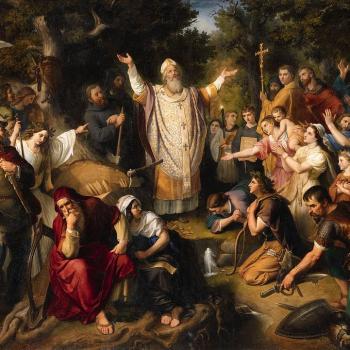Have a blessed Saint Valentines Day!
I thought today I would share an article written by the German Reformer Martin Luther. My wife and I recently read through this together, and we both found a good deal of life in it. I hope you enjoy it, and can take to heart the depth of God’s call to love one another!
The Estate of Marriage (selections) by Martin Luther
tr. Brandt, from “luther’s works, volume 45.” (Fortress Press, 1962)
The world says of marriage, “Brief is the joy, lasting the bitterness.” Let them say what they please; what God wills and creates is bound to be a laughingstock to them. The kind of joy and pleasure they have outside of wedlock they will be most acutely aware of, I suspect, in their consciences. To recognise the estate of marriage is something quite different from merely being married. He who is married but does not recognise the estate of marriage cannot continue in wedlock without bitterness, drudgery, and anguish; he will inevitably complain and blaspheme like the pagans and blind, irrational men. But he who recognises the estate of marriage will find therein delight, love, and joy without end; as Solomon says, “He who finds a wife finds a good thing,” etc. [Prov. 18:22].
Now the ones who recognise the estate of marriage are those who firmly believe that God himself instituted it, brought husband and wife together, and ordained that they should beget children and care for them. For this they have God’s word, Genesis 1 [:28], and they can be certain that he does not lie. They can therefore also be certain that the estate of marriage and everything that goes with it in the way of conduct, works, and suffering is pleasing to God. Now tell me, how can the heart have greater good, joy, and delight than in God, when one is certain that his estate, conduct, and work is pleasing to God?
Now observe that when that clever harlot, our natural reason (which the pagans followed in trying to be most clever), takes a look at married life, she turns up her nose and says, “Alas, must I rock the baby, wash its diapers, make its bed, smell its stench, stay up nights with it, take care of it when it cries, heal its rashes and sores, and on top of that care for my wife, provide for her, labour at my trade, take care of this and take care of that, do this and do that, endure this and endure that, and whatever else of bitterness and drudgery married life involves? What, should I make such a prisoner of myself? 0 you poor, wretched fellow, have you taken a wife? Fie, fie upon such wretchedness and bitterness! It is better to remain free and lead a peaceful. carefree life; I will become a priest or a nun and compel my children to do likewise.”
What then does Christian faith say to this? It opens its eyes, looks upon all these insignificant, distasteful, and despised duties in the Spirit, and is aware that they are all adorned with divine approval as with the costliest gold and jewels. It says, “0 God, because I am certain that thou hast created me as a man and hast from my body begotten this child, I also know for a certainty that it meets with thy perfect pleasure. I confess to thee that I am not worthy to rock the little babe or wash its diapers. or to be entrusted with the care of the child and its mother. How is it that I, without any merit, have come to this distinction of being certain that I am serving thy creature and thy most precious will? 0 how gladly will I do so, though the duties should be even more insignificant and despised. Neither frost nor heat, neither drudgery nor labour, will distress or dissuade me, for I am certain that it is thus pleasing in thy sight.”
A wife too should regard her duties in the same light, as she suckles the child, rocks and bathes it, and cares for it in other ways; and as she busies herself with other duties and renders help and obedience to her husband. These are truly golden and noble works. This is also how to comfort and encourage a woman in the pangs of childbirth, not by repeating St Margaret legends and other silly old wives’ tales but by speaking thus, “Dear Grete, remember that you are a woman, and that this work of God in you is pleasing to him. Trust joyfully in his will, and let him have his way with you. Work with all your might to bring forth the child. Should it mean your death, then depart happily, for you will die in a noble deed and in subservience to God. If you were not a woman you should now wish to be one for the sake of this very work alone, that you might thus gloriously suffer and even die in the performance of God’s work and will. For here you have the word of God, who so created you and implanted within you this extremity.” Tell me, is not this indeed (as Solomon says [Prov. 18:22]) “to obtain favour from the Lord,” even in the midst of such extremity?
Now you tell me, when a father goes ahead and washes diapers or performs some other mean task for his child, and someone ridicules him as an effeminate fool, though that father is acting in the spirit just described and in Christian faith, my dear fellow you tell me, which of the two is most keenly ridiculing the other? God, with all his angels and creatures, is smiling, not because that father is washing diapers, but because he is doing so in Christian faith. Those who sneer at him and see only the task but not the faith are ridiculing God with all his creatures, as the biggest fool on earth. Indeed, they are only ridiculing themselves; with all their cleverness they are nothing but devil’s fools.
St. Cyprian, that great and admirable man and holy martyr, wrote that one should kiss the new-born infant, even before it is baptised, in honour of the hands of God here engaged in a brand new deed. What do you suppose he would have said about a baptised infant? There was a true Christian, who correctly recognised and regarded God’s work and creature. Therefore, I say that all nuns and monks who lack faith, and who trust in their own chastity and in their order, are not worthy of rocking a baptised child or preparing its pap, even if it were the child of a harlot. […]
But the greatest good in married life, that which makes all suffering and labour worth while, is that God grants offspring and commands that they be brought up to worship and serve him. In all the world this is the noblest and most precious work, because to God there can be nothing dearer than the salvation of souls. Now since we are all duty bound to suffer death, if need be, that we might bring a single soul to God, you can see how rich the estate of marriage is in good works. God has entrusted to its bosom souls begotten of its own body, on whom it can lavish all manner of Christian works. Most certainly father and mother are apostles, bishops, and priests to their children, for it is they who make them acquainted with the gospel. In short, there is no greater or nobler authority on earth than that of parents over their children, for this authority is both spiritual and temporal. whoever teaches the gospel to another is truly his apostle and bishop. Mitre and staff and great estates indeed produce idols, but teaching the gospel produces apostles and bishops. See therefore how good and great is God’s work and ordinance! […]













